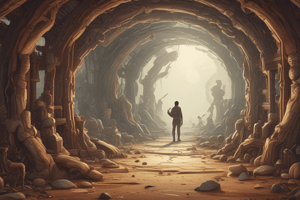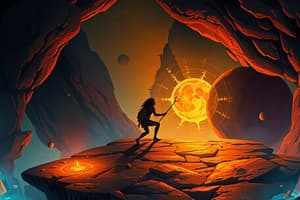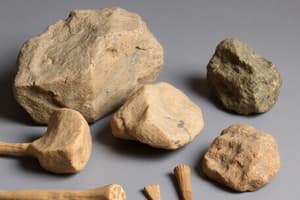Podcast
Questions and Answers
What primary motivation drove early humans to develop science and technology?
What primary motivation drove early humans to develop science and technology?
- Desire to understand complex mathematics
- Need for survival and sustenance (correct)
- Curiosity about the cosmos
- Interest in creating art and literature
Which of the following discoveries is attributed to early humans as they developed science?
Which of the following discoveries is attributed to early humans as they developed science?
- The invention of the wheel
- Understanding of the solar system
- Development of written language
- Discovery of mud plaster leading to pottery (correct)
In what region was the first known pottery discovered?
In what region was the first known pottery discovered?
- Japan around 10,000 B.C. (correct)
- China around 6000 B.C.
- Egypt around 3000 B.C.
- Mesopotamia around 8000 B.C.
What method did early humans use to begin their understanding of the world?
What method did early humans use to begin their understanding of the world?
What role did archeological excavations play in our understanding of early human science?
What role did archeological excavations play in our understanding of early human science?
Flashcards are hidden until you start studying
Study Notes
Early Human Curiosity
- Early humans had a natural curiosity to understand their nature and the world around them.
- They observed environmental patterns, cycles, and repetitions to seek answers to their questions.
Development of Science
- Through experience, early humans learned to analyze and organize information.
- This process led to the foundational understanding of science, enabling further discoveries.
- Science evolved through the discovery and invention of tools as knowledge progressed.
Contributions of Archaeology
- Advances in archaeology have provided vital data and evidence through excavation.
- New scientific instruments and techniques helped enhance archaeological findings.
Practical Applications of Science
- Scientific discovery was often motivated by survival needs, such as the quest for food.
- Curiosity also played a significant role in the development of science and technology.
Key Inventions
- Notable discoveries include mud plaster that contributed to the creation of pottery and mud brick houses.
- The earliest known pottery was discovered in Japan, dating back to around 10,000 B.C.
Studying That Suits You
Use AI to generate personalized quizzes and flashcards to suit your learning preferences.




